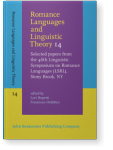Chapter 16
Against control by implicit passive agents
Landau (2010, 2013) and van Urk (2011, 2013) argue that the understood agent of a passive verb is syntactically projected as a weak implicit argument. As such, it participates actively in Agree and predication, the mechanisms they assume are responsible for antecedent determination in control structures. This article examines French data involving control and passivization and proposes an alternative explanation for the facts, one that makes the diametrically opposed assumptions that the implicit agent of a passive verb is syntactically unprojected and that the reference of PRO is determined post-syntactically.
Article outline
- 1.Introduction
- 2.Landau (2000, 2010, 2013), van Urk (2011, 2013) and Reed (2014)
: Some points of agreement and contention
- 3.Further examining the interaction of control with passivization
- 3.1Reconsidering Visser’s effects
- 3.2A syntactic constraint on impersonal passivization
- 3.3On an unexpected parallel between OC PRO and overt bound pronouns
- 3.4On unexpected WIA control in indirect questions
- 4.Against control by weak implicit passive agents
-
Acknowledgements
-
References
References (35)
References
Bowers, John. 2002. “Transitivity.” Linguistic Inquiry 33 (2): 183–224.

Brame, Michael. 1978. Base generated syntax. Seattle: Noit Amrofer.
Bruening, Benjamin. 2013. “
By phrases in passives and nominals.” Syntax 16 (1): 1–41.

Butler, Lindsay. 2009. “Explaining logophoricity, with special reference to Aghem.” Ms., The University of Arizona.
Cardinaletti, Anna, and Ur Shlonsky. 2004. “Clitic positions and restructuring in Italian.” Linguistic Inquiry 35 (4): 519–557.

Chomsky, Noam, and Howard Lasnik. 1977. “Filters and control.” Linguistic Inquiry 8 (3): 425–504.
Chomsky, Noam, and Howard Lasnik. 1995. “The theory of principles and parameters.” In The Minimalist Program, Noam Chomsky, 13–127. Cambridge, MA: MIT Press.
Evers, Arnold. 1975. “The transformational cycle in Dutch and German.” Ph.D. dissertation, University of Utrecht.
Hagège, Claude. 1974. Les pronoms logophoriques. Bulletin de La Société de Linguistique de Paris 69: 287–310.
Hornstein, Norbert. 1999. “Movement and control.” Linguistic Inquiry 30 (1): 69–96.

Jackendoff, Ray, and Peter Culicover. 2003. “The semantic basis of control in English.” Language 79 (3): 517–556.

Jenkins, Lyle. 1972. “Modality in English syntax.” Ph.D. dissertation, MIT.
Landau, Idan. 2000. Elements of Control: Structure and meaning in infinitival constructions. Dordrecht: Kluwer Academic Publishers.

Landau, Idan. 2004. “The scale of finiteness and the calculus of control.” Natural Language and Linguistic Theory 22 (4): 811–877.

Landau, Idan. 2010. “The explicit syntax of implicit arguments.” Linguistic Inquiry 41 (3): 357–388.

Landau, Idan. 2013. Control in generative grammar. Cambridge: Cambridge University Press.

Lasersohn, Peter. 1993. “Lexical distributivity and implicit arguments.” In SALT III, ed. by Utpal Lahiri and Adam Wyner, 145–161. Ithaca, NY: Cornell University.
Montague, Richard. 1974. “The proper treatment of quantification in ordinary English.” In Formal philosophy, ed. by Richard Thomason, 247–270. New Haven, CT.: Yale University Press.
O’Neil, John. 1995. “Out of control.” In Proceedings of the Twenty-Fifth Meeting of the North East Linguistic Society, Volume 1 (NELS 25), ed. by Jill Beckman, 361–371. Amherst: GLSA.
Parsons, Terence. 1990. Events in the semantics of English. Cambridge, MA: MIT Press.
Postal, Paul. 1970. “On coreferential complement subject deletion.” Linguistic Inquiry 1 (4): 439–500.
Reed, Lisa. 1992. “Remarks on word order in causative constructions.” Linguistic Inquiry 23 (1): 164–172.
Reed, Lisa. 2014. Strengthening the PRO hypothesis. Berlin: Mouton de Gruyter.
Reed, Lisa. 2016. “Some notes on devoir, falloir, and the theory of control.” In Romance linguistics 2013. Selected papers from the 43rd Linguistic Symposium on Romance Languages (LSRL), ed. by Christina Tortora, Marcel den Dikken, Ignacio L. Montoya, and Teresa O’Neill, 341–360, Amsterdam: John Benjamins.
Rizzi, Luigi. 1986. “Null objects in Italian and the theory of pro
.” Linguistic Inquiry 17 (3): 501–557.
Rizzi, Luigi. 2001. “On the position ‘Int(errogative)’ in the left periphery of the clause.” In Current studies in Italian syntax, ed. by Guglielmo Cinque and Giampaolo Salvi, 287–296. Amsterdam: Elsevier.
Roeper, Thomas. 1987. “Implicit arguments and the head-complement relation.” Linguistic Inquiry 18 (2): 267–310.
Saab, Andrés. 2014. “Syntax or nothing: Some theoretical and empirical remarks on implicit arguments.” Borealis: An international journal of Hispanic linguistics 3 (2): 125–183.

Safir, Kenneth. 1985. Syntactic chains. Cambridge: Cambridge University Press.
van Urk, Coppe. 2011. “Visser’s Generalization: A window into the syntax of control.” Ms., MIT.
van Urk, Coppe. 2013. “Visser’s Generalization: The syntax of control and passive.” Linguistic Inquiry 44 (1): 168–178.

Visser, Fredericus Theodoricus. 1973. A historical syntax of the English language. Vol. III.2. Leiden: Brill.
Williams, Edwin. 1985. “PRO and subject of NP.” Natural Language and Linguistic Theory 3 (3): 297–315.

Williams, Edwin. 1987. “Implicit arguments, the binding theory and control.” Natural Language and Linguistic Theory 5 (2): 151–180.

Williams, Edwin. 1992. “Adjunct control.” In Control and grammar, ed. by Richard Larson, Sabine Iatridou, Utpal Lahiri, and James Higginbotham, 297–322. Dordrecht: Kluwer Academic Publishers.

Cited by (1)
Cited by one other publication
AKKUŞ, FARUK
2021.
Variable embedded agent in Sason Arabic.
Journal of Linguistics 57:2
► pp. 233 ff.

This list is based on CrossRef data as of 27 july 2024. Please note that it may not be complete. Sources presented here have been supplied by the respective publishers.
Any errors therein should be reported to them.
